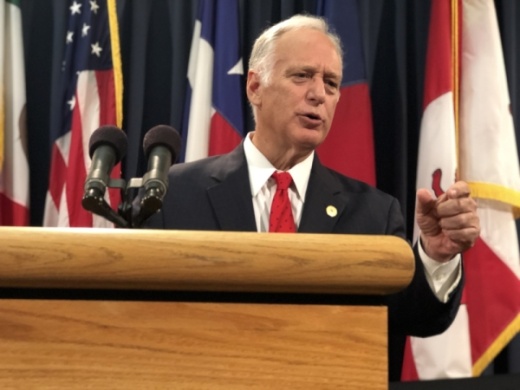Watson called the political divide in the 1990s a “de-facto two-party system,” but he was not referring to Republicans and Democrats. Instead, he said the split was between environmentalists and developers: The Sierra Club and the Save Our Springs Alliance on one side, the Greater Austin Chamber of Commerce and Real Estate Council of Austin on the other.
On Feb. 18, the day that Watson announced his resignation from the state Senate, he reflected on his role in changing local politics from the divided landscape it was two decades ago.
“One of the things I’m most proud of is we brought forward policies that allowed that de-facto two-party system to fall away,” Watson said.
In a letter submitted to Gov. Greg Abbott on Feb. 18, Watson said his last day in office will be April 30. He will be leaving his seat in Austin to become the founding dean at the University of Houston Hobby School of Public Affairs.
According to a press release from UH, the Hobby School was originally founded as the Hobby Center for Public Policy in 1981 before it became a stand-alone academic entity in 2016. The Hobby School offers a Master of Public Policy degree as well as dual degree programs in partnership with other UH departments, according to its website.
Watson said he believes his experience working with legislators from the other side of the aisle will serve him well as he makes the move to higher education.
“One of the things I felt I have done well—no one has questioned my credentials as a Democrat—but figuring out ways to listen to other people, to hear them, to involve them, to learn from them. It is one of the things that allowed me to have success in the Texas Senate,” Watson said. “I frankly think it’s one of the skills of good leadership that needs to be taught.”
According to Watson’s release, his resignation will give Gov. Greg Abbott a “reasonable amount of time” before a special election and give the incoming state senator time to prepare for the 2021 legislative session. The state has not announced the date of that forthcoming special election.
Watson was first elected to the Senate in 2006 in a district that covers most of Travis County and all of Bastrop County. Previously, he served as mayor of Austin from 1997 to 2001.
Before the end of the day Feb. 18, some local politicians had already expressed an interest in the seat. Austin City Council Member Greg Casar told Community Impact Newspaper he is “seriously considering a run for the seat,” and Travis County Judge Sarah Eckhardt posted in a tweet that she is “considering running in the special election to step into his shoes in Senate District 14.”
Watson said he will step aside rather than influence the choice of his successor.
“I do not plan to get involved in that,” he said. “My guess is that there will be a number of people who are very interested in it.”
According to Texas Election Code, the governor has the authority to call a special election when there is a vacancy in either chamber of the Texas Legislature. Abbott has yet to set the date of the special election for Watson’s seat. When he does call the election, state code stipulates it take place at least 36 days after the order on a uniform election date in March, May or November.





